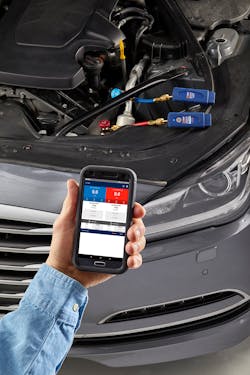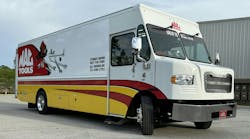As time goes on a vehicle’s A/C system can become less efficient while dispersing ever larger amounts of refrigerant. Meanwhile, the driver will find it difficult to manage his or her cabin temperature. A/C issues are as much about safety as they are comfort. They also represents significant opportunity for shop owners.
According to MACS (Mobile Air Conditioning Society), R-1234yf machines topped shops’ wishlists for 2019, along with leak detectors, refrigerant identifiers, scan tools and scopes, and for good reason. Mark Kustra, automotive product marketing manager at CPS Automotive says “This signals that shop owners are willing to — and do — invest in the tools, equipment and information sources required for efficient and effective service and repair.”
A/C tools and equipment are designed to help technicians handle refrigerant properly, which includes safely removing it from or putting it back into a vehicle, and preventing leakage.
Many manufacturers acknowledge that, as vehicles and repairs grow more complex, they must design products accordingly, with equipment that is fairly intuitive while also meeting current industry standards. “Automation” and “efficiency” are key words used to describe new-to-market A/C service, as is the phrase “R-1234yf”.
Refrigerant-ready
The biggest item to note regarding A/C work is the move towards R-1234yf refrigerant. Vehicles that use 1234yf are hitting shops now. New recovery machines will help to get the process started.
“By the end of 2018 84 million vehicles were using 1234yf,” says Peter Coll. Coll is VP of Sales & Marketing with company Neutronics, as well as Chairman of the SAE Interior Climate Control Service Committee (ICCC). Neutronics manufactures refrigerant analyzers and makes portable devices that allow operators to step away from RRR machines to test vehicles. Coll says dealerships primarily have equipment to service vehicles with 1234yf, but body shops are adopting the equipment and adding it to their service menu as well.
“We’re finding that the price for serving — just serving — 1234yf from the dealer is extremely high: some dealers are getting $500 just to evacuate and recharge the system, not including refrigerant. They’re the only game in town,” he says.
To be 1234yf-ready, shop owners need to understand some general requirements about working with the newest refrigerant. First up: investing in a machine that can handle it.
Recover/Recycle/Recharge (RRR) machines are central to A/C service, and with a nod to new SAE standards and requirements — as well as the next generation of technicians — these machines are built to be efficient, effective and user-friendly.
Bosch Automotive Solutions' Tim Wagaman, product manager for fluid transfer equipment, says today’s A/C service equipment must meet stricter regulations and standards, including new procedures for R-1234yf service. The company recently revamped its line of leak detection products in the last few years to feature enhanced efficiency and automatic operation.
“Shops will need to invest in a new machine and manual oil injectors, to start,” he says. “It must have an internal refrigerator identifier and will not inject oil into the vehicle’s system — it’s a manual process. After that, every technician should take a Section 609 refresher course from MACS to fully understand the differences and service needs for a 134a versus a 1234yf system.” He adds 1234yf service takes longer than 134a systems (roughly 60-75 minutes for yf service), so technicians should be aware of the additional time when scheduling service and communicate this to customers.
New model yf machines are designed to prevent cross-contamination. This keeps new yf and existing 134a systems working properly. “Failure to use the correct machine can damage the vehicle’s AC system and may potentially damage your AC machine,” says Wagaman, adding, “The connectors on the low and high side for the 1234yf service are also different than 134a connectors, helping to prevent the incorrect machine being used on the wrong system.”
Technical Service Representative Jim Miller at Ritchie Engineering Co. adds, “When working with R-1234yf, refrigerant purity is critical. When contaminated refrigerant is encountered, unique equipment is required for recovery. Due to the cost of R-1234yf, minimizing loss of refrigerant is a high priority.”
Next-gen tools
Dario Peruch, General Manager at TEXA USA points out today’s technicians are more aware of and attentive to procedures than ever before and are seeking out smarter ways to perform services like A/C repair. He says fully automatic machines make this task easier. “Mechanics know it is not possible to simply add refrigerant, but [they recognize] it’s necessary to use a dedicated machine to recover and fully recharge the system,’” says Peruch.
TEXA recently developed a fully automatic RRR machine for the North American market. The TEXA Konfort 750R features a dedicated app for Android and iOS that lets technicians check the status of the service on his or her mobile phone. The app also notifies technicians if there’s a problem, or when the service is done, so technicians can focus on other activities during the recovery and recharge.
Ritchie’s Miller confirms more A/C service and repair tools are moving from analog to digital to provide for faster and more accurate data. “Younger technicians especially are more comfortable with digital devices and newer technology; they embrace it,” he says.
Leak detection updates
Incoming 1234yf refrigerant will change leak detection methods as well as RRR machines. New refrigerant identifiers can detect R-1234yf refrigerant, helping to avoid cross-contamination; and next-gen leak detectors are more sensitive than ever and can help to “sniff out” and pinpoint small leaks.
Brian Green, Tracer Products’ VP of Marketing, says modern 1234yf AC systems have new compatibility requirements for fluorescent leak detection. “In recent years, concerns about rising fuel costs have pushed manufacturers to develop more efficient vehicle systems that use less energy and are more environmentally friendly. As a result, R-1234yf systems now use smaller refrigerant oil charges. In addition, the type of refrigerant oil used has changed as well.”
Green says that manufacturing a safe dye for R-1234yf systems is a complex task. Dyes for R-1234yf vehicles must be consistent with the 42cSt viscosity oil standard. Even if a dye meets this standard, it must also be formulated with OEM-grade R-1234yf oil, such as Denso ND12 or other high-grade oils. “These oils are inherently safe because they have a 42-46cSt oil viscosity,” says Green. “If a leak detection dye is formulated with one of these oils, it can be used without appreciably changing system oil viscosity or additive balance. A dye formulated with R-1234yf oil would be harmless to a system in any reasonable amount.”
He adds, this dye is tested and approved by OEMs and can be safely used within any belt-driven R-1234yf PAG system.
Going forward, new R-1234yf refrigerant may challenge traditional leak detection methods. “What has worked in the past is now becoming obsolete,” says Tracer Products’ Green. “So it’s very important to have the right air conditioning repair tools that are engineered for the new, ultra-efficient vehicle systems. AC tools that are not specialized and up-to-date with current automotive trends are less effective, and could possibly be dangerous to R-1234yf AC systems.”
Have the conversation
Do you have a customer open to investing in A/C service equipment? Here are some questions to ask:
Are you certified to perform A/C service?
How much A/C service do you perform in an average week, or how much do you anticipate doing in an average week if you add this service?
Do you know that A/C recovery machines are among the tools with the fastest ROI?
How old is the equipment you’re using?
Do you intend to work on 1234yf? Are you ready now?
How do you find and fix system leaks?
Do you service hybrid or electric vehicles?
For many shops, A/C service can mean untapped potential. Help them to research and re-tool their shop in time to greet R-1234yf vehicles.


